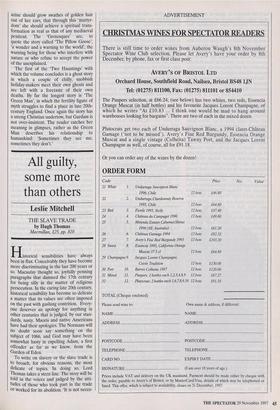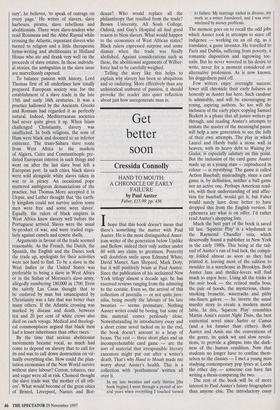All guilty, some more than others
Leslie Mitchell
THE SLAVE TRADE by Hugh Thomas Macmillan, £25, pp. 810
■=I
Historical sensibilities have always been in flux. Conceivably they have become more discriminating in the last 200 years or so. Macaulay thought so, joyfully penning paragraphs that damned the 17th century for being silly in the matter of religious persecution. In the caring late 20th century, historical sensibility has become so delicate a matter that its values are often imposed on the past with gushing contrition. Every- one deserves an apology for anything in other centuries that is judged, by our stan- dards, nasty. Maoris and native Americans have had their apologies. The Normans will no doubt soon say something on the subject of 1066, and God may have been somewhat hasty in expelling Adam, a first offender as far as we know, from the Garden of Eden.
To write on slavery or the slave trade is to broach, for obvious reasons, the most delicate of topics. In doing so, Lord Thomas takes a stern line. The story will be told in the voices and judged by the atti- tudes of those who took part in the trade or worked for its abolition. 'It is not neces- sary', he believes, 'to speak of outrage on every page.' He writes of slavers, slave harbours, pirates, slave rebellions and abolitionists. There were slave-traders who read Rousseau and the Abbe Raynal while crossing the Atlantic, repentant slavers who turned to religion and a little therapeutic hymn-writing and abolitionists at Holland House who ate and drank very well on the proceeds of slave estates. In these individu- al stories, the ambiguities in the slave issue are marvellously exposed.
To balance passion with history, Lord Thomas first of all underlines how totally prepared European society was for the establishment of a slave trade in the late 15th and early 16th centuries. It was a practice hallowed by the Ancients. Greeks and Romans had regarded it as perfectly natural. Indeed, Mediterranean societies had never quite given it up. When Islam challenged Christianity, slavery was unaffected. In both religions, the sons of Ham were black and doomed to an inferior existence. The trans-Sahara slave route from West Africa to the markets of Algiers, Cairo and Constantinople pre- dated European interest in such things and went on after the last slave boat left a European port. In such cities, black slaves were sold alongside white slaves taken in war or in piracy. An occasional pope muttered ambiguous denunciations of the practice, but Thomas More accepted it in Utopia, and Luther thought that 'the earth- ly kingdom could not survive unless some men were free and some were slaves'. Equally, the rulers of black empires in West Africa knew slavery well before the Portuguese arrived. Slaves were the usual by-product of war, and were traded regu- larly against camels and cowrie shells.
Arguments in favour of the trade seemed reasonable. As the French, the Dutch, the Spanish, the English and the Danes took the trade up, apologists for their activities were not hard to find. To be a slave in the West Indies or the United States was preferable to being a slave in West Africa or in the Sultan of Morocco's slave army, allegedly numbering 180,000 in 1700. Even the saintly Las Casas thought that to be enslaved by man but emancipated by Christianity was a fate that was better than many others. If the Atlantic crossing was marked by disease and death, between ten and 20 per cent of white crews also died on each voyage. Medical and theologi- cal commonplaces argued that black men had a lesser inheritance than other races.
By the time that serious abolitionist movements became vocal, so much had come to depend on slavery that to call for its end was to call down destruction on vir- tually everything else. How could the plan- tation economies of the New World survive without slave labour? Cotton, tobacco, rice and sugar were all at risk. Choiseul thought the slave trade was 'the mother of all oth- ers'. What would become of the great cities of Bristol, Liverpool, Nantes and Bor- Beaux? Who would replace all the philanthropy that resulted from the trade? Brown University, All Souls College, Oxford, and Guy's Hospital all had good reason to bless slavers. What would happen to the economies of West African states? Black rulers expressed surprise and some dismay when the trade was finally abolished. Against considerations such as these, the abolitionist arguments of Wilber- force had to be carefully weighed.
Telling the story like this helps to explain why slavery has been so ubiquitous and so enduring. More effectively than any unhistorical outburst of passion, it should provoke the reader into quiet reflection about just how unregenerate man is.



















































































 Previous page
Previous page